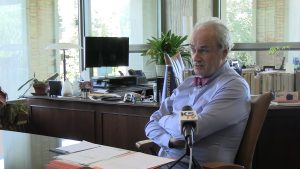Learning from the founders of democracy
February 28, 2005
Do you know how to use the word whom correctly?
Do you know that media is the plural form of medium?
Do you know the difference between sex and gender?
In last week’s column, one of my friends found an error in my column which was not my fault. The phrase “using their respective fora to give” was changed to “using their respective for a to give” at some point after I submitted it. Those who made the change did not know that fora is the plural of forum; the sentence does not make sense when “for a” is used.
This simple mistake is a symptom of a plague that infects our entire society including myself (as ashamed as I am to admit it). I try my best to use proper grammar, but I find it extremely difficult to do so because no one around me seems to care.
While I want to blame the English department, blame is best laid at the feet of high schools. In my high school, the English curriculum was to read books, almost always fiction, and to write essays about their themes, symbolism, etc. The flaw to this approach is its perceived lack of utility. Students misinterpret the exercise as busy work because they simply do not care about subliminal messages in works of fiction.
The English curriculum did not inspire me to read and think but to skim and bullshit. I became somewhat talented in a bad way. Like most of my classmates, I found the fiction very boring and pointless. My grammatical proficiency benefited more from studying foreign languages than from studying fiction.
I understand the importance of optimal communication skills, but pretending to be a literary critic cannot be the best way to turn a stuttering idiot into an articulate statesman.
Students should study rhetoric.
One writes the way he speaks simply because one speaks more often than he writes; therefore, the best way to improve someone’s writing skills — the implied purpose of English class — is to improve his speaking skills. Everyone uses their speaking skills every day; even those who shouldn’t. Everyday conversation would be a much more enlightening experience if more people could articulate their thoughts better. Of course, good rhetoric requires blood-boiling issues.
Political issues lend themselves to rhetoric so perfectly. Even people who don’t vote usually care enough to have an opinion. I find great irony in that public speaking is such a common fear in a country that claims to value free speech so highly.
Rhetoric education would promote good citizenship because students would study important issues in preparation for class. Furthermore, the average person would be empowered to stand against politicians. Because compelling speakers are usually lawyers, even a politician of sub-mediocre intelligence could outdebate an above average civilian.
In ancient Athens, all men received formal training in rhetoric so that a poor farmer could argue his point as well as a most esteemed leader. This system created a level plane upon which citizens could affect useful change most efficiently. As long as we are enslaved by pompous hypocrites, we can never achieve an honorable society.
Don Norvell is a physics graduate assistant and a columnist for the Daily Kent Stater. Contact him at [email protected].
















